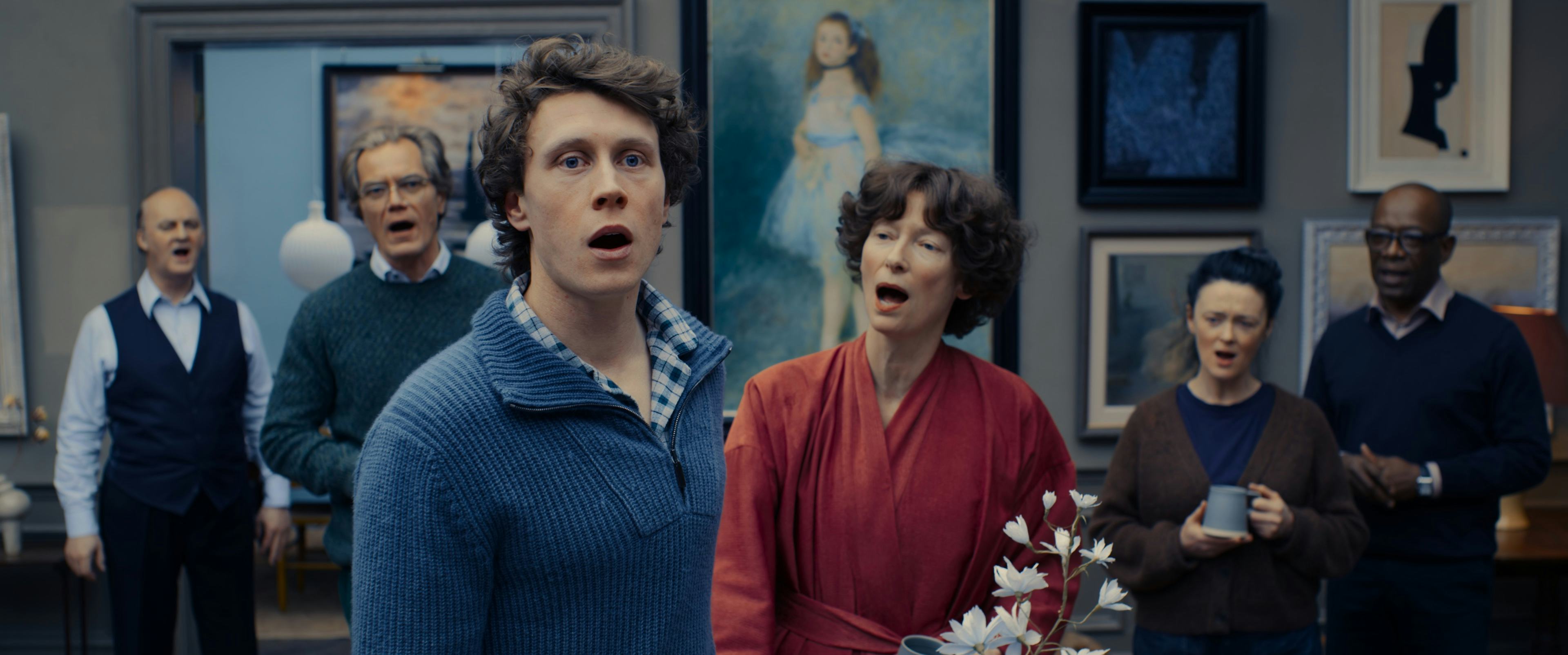
The day starts off like any other for the Family: they wake up, fuss over the placement of the carefully curated classic art decorating their walls, work on their dioramas, revise their memoirs, and practice survival drills for the inevitable spread of toxic air. Of course, they do all this while singing grand, sweeping songs (that are sometimes accompanied by choreography). The curious combination of apocalyptic chamber piece with movie musical makes Joshua Oppenheimer’s new feature film The End an intriguing experiment — and an even more disappointing failure.
The End is the first scripted feature from Oppenheimer, who was twice Oscar-nominated for his documentaries The Act of Killing and The Look of Silence. When it was announced that Oppenheimer would make his narrative feature directorial debut with a post-apocalyptic musical starring Tilda Swinton, it certainly piqued the interest of the arthouse movie world. But while The End and its highly stylized, bleak vision of post-global warming future may still appeal to arthouse critics, The End still mostly fails as a narrative feature and as a musical.
The unnamed Family at the center of The End consists of Mother (Swinton), Father (Michael Shannon), and Son (George MacKay), who have sequestered themselves away in an elaborately stocked bunker with Mother’s Friend (Bronagh Gallagher), the Butler (Tim McInnerny), and the Doctor (Lennie James). But “bunker” is sort of an ill-fitting description — their home is more like a mansion that has been transplanted underground, where it’s safe from the fiery inferno that has engulfed the Earth’s surface. The mansion is full of priceless art, antique furniture, and a piano that Mother, who was a former ballerina, never plays. Every day, the group eats gourmet meals prepared by Friend, who was a renowned chef in the Before Times, and is served tea by Butler, who busies himself by repairing the slowly-cracking walls of the bunker, or gets the occasional check-up from Doctor. And every day, Son helps write his Father’s memoir, which Father (a former oil tycoon) carefully massages so as to make it seem like he wasn’t responsible for the end of the world. After decades underground, it’s clear that the relationships among the group are starting to fracture, but the survivors have one unifying belief: that Son is the future, and he must be protected.
But that delicate balance is threatened when a Girl (Moses Ingram) is found unconscious at the far edge of the underground caverns where their bunker sits. The group goes into a panic — the last time they let survivors into their bunker, they were attacked and nearly murdered. They decide to treat her wounds and send her back to the surface, but Girl is terrified of going back, and begs to stay with them. Her pleas tug the heartstrings of Son, who is suspicious, but mostly intrigued, by the first new person he’s ever seen in his life. For a while, The End continues as you’d expect: Son and Girl start up a timid flirtation, and fall in love, but Girl still faces distrust from Mother, who dislikes the questions that Girl keeps asking about her family.
Despite its small ensemble and limited setting, The End has a lot on its mind. It alludes to the dangers of climate change and the part that Big Oil has in slowly destroying the world, and picks at the scab of guilt that the Family has carried with them since they’ve squirreled themselves away with priceless art and none of their other relatives. And with the introduction of Ingram’s Girl, a Black woman who is keenly aware of the veiled microaggressions Mother and Father lob at her, as well as the naive mindset that Son has been raised with, The End almost says something interesting about race and classism. However, it only brushes up against these big ideas, building up to an explosive confrontation, only for the characters to repress their unhappiness and let it simmer, preferring to play house in their slowly disintegrating bunker. At first its unpredictability is charming, with The End unafraid to probe at its thornier character flaws. It would all be very interesting if it weren’t so boring.

But what of the musical aspect? Shouldn’t that make this movie at least a little fun? Not quite — most of the songs, composed by indie stage lyricist Joshua Schmidt and Moulin Rouge musical director Marius de Vries, are mournful ballads only a few notes off from a funeral dirge. And Oppenheimer mostly chooses to shoot the musical sequences in languid long takes, the camera swooping from room to room as the characters stand and sing and stare at each other. The only sequence with a bit of energy and dynamism is performed by MacKay’s son, in a Footloose-esque solo rock number in which he struggles with the budding feelings he has over Girl. But for the most part, The End feels like it wastes its musical gimmick, and instead resorts to being a sluggish chamber piece that meanders endlessly.
It feels like a shame, as Swinton, Shannon, MacKay, and Ingram are especially game for this unique experiment. Swinton, as always, excels at playing the brittle, standoffish rich woman, while Shannon throws in a dash of bigotry with his feigned ignorance. Ingram is perfectly endearing, a vulnerable open book who becomes the easiest character for the audience to latch onto. MacKay, meanwhile, is the standout of the film, delivering the aforementioned electrifying musical sequences while straddling the line between guileless and mercurial.
Ultimately, The End’s biggest sin is that it felt like it would never end. As visually striking as it was (credit to Oppenheimer and director of photography Mikhail Krichman), as big as its ideas were, and as unique as its premise was, none of it cohered. It was as staid as the art decorating the walls of the Family’s bunker — beautiful, pristine, and lifeless.







